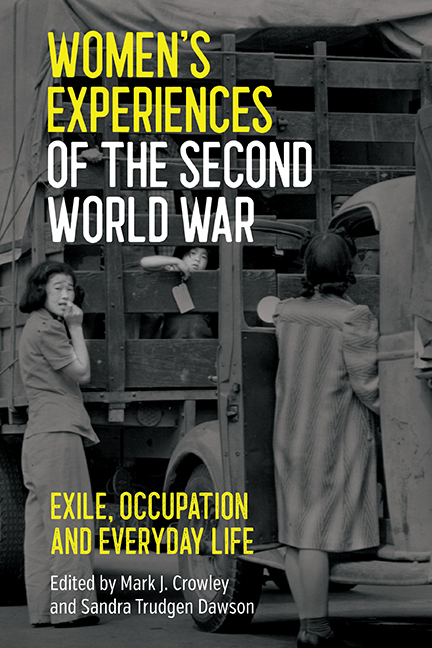Book contents
- Frontmatter
- Dedication
- Contents
- List of Illustrations
- List of Contributors
- Acknowledgements
- List of Abbreviations
- Introduction: Women’s Experiences of the Second World War: Exile, Occupation and Everyday Life
- Part One Living in Exile and under Wartime Occupation
- Part Two Living with Wartime Occupiers
- Part Three Everyday Life at Home and on the Battle Front
- Index
Introduction: Women’s Experiences of the Second World War: Exile, Occupation and Everyday Life
Published online by Cambridge University Press: 03 June 2021
- Frontmatter
- Dedication
- Contents
- List of Illustrations
- List of Contributors
- Acknowledgements
- List of Abbreviations
- Introduction: Women’s Experiences of the Second World War: Exile, Occupation and Everyday Life
- Part One Living in Exile and under Wartime Occupation
- Part Two Living with Wartime Occupiers
- Part Three Everyday Life at Home and on the Battle Front
- Index
Summary
The Second World War was a conflict that affected the everyday life of millions of people around the globe. The war was truly global, and its impact felt far from the battlefields. Indeed, this was a war that defied and complicated the idea of ‘fronts’, and made the division between battlefields and civilian environments difficult to define. The war targeted civilians who died in far greater numbers than military personnel. As civilians and as combatants, women were very much a part of the war. This collection focuses on some of their experiences.
The women studied in this volume experienced exile from home and occupation by foreign troops. They accompanied armies as auxiliaries and military nurses. They fought alongside male peers, served as missionaries to the interned and the blind, and lived their everyday lives in difficult circumstances. Some women experienced a loss of freedom and individual rights, while others used their voice to lobby politicians to change military policies. Several of the women in this volume found that the war years opened more opportunities for work or marriage, while others were denied the opportunity to continue relationships or employment. Some women lived through the war years, while others did not survive. Many of the chapters in the collection are based on diaries, letters, and memoirs of individuals, on interviews, scrapbooks and photographs. As micro histories, they reveal the way the politics of war are immensely personal, and have an impact on the minutiae of daily life. Thus, as editors, we believe the micro histories in this volume are a useful way to examine some of the diverse experiences of individuals living during a time of total war.
As scholars recognize the significance of documenting and analyzing the entirety of wartime experiences, the literature on women and the Second World War is growing. The first studies tended to focus on women's war work and contributions to the war effort on the home front. Influenced in part by feminism and Joan Scott's seminal article on the usefulness of gender as a category of analysis, these studies emphasized the patriarchal structures that complicated women's lives, and also illustrated the significance of their wartime labour. Recent studies explore women's work in military auxiliary units, as partisans and spies, as military nurses and in reproduction, food production and rationing, and as sex workers.
- Type
- Chapter
- Information
- Women's Experiences of the Second World WarExile, Occupation and Everyday Life, pp. 1 - 8Publisher: Boydell & BrewerPrint publication year: 2021



